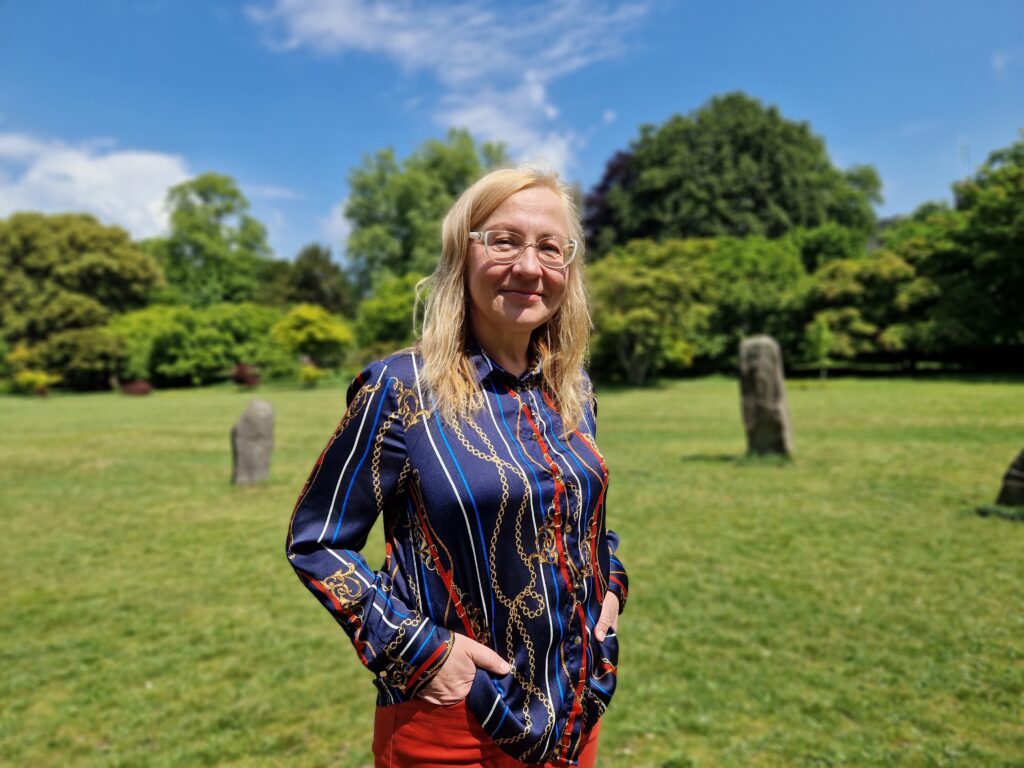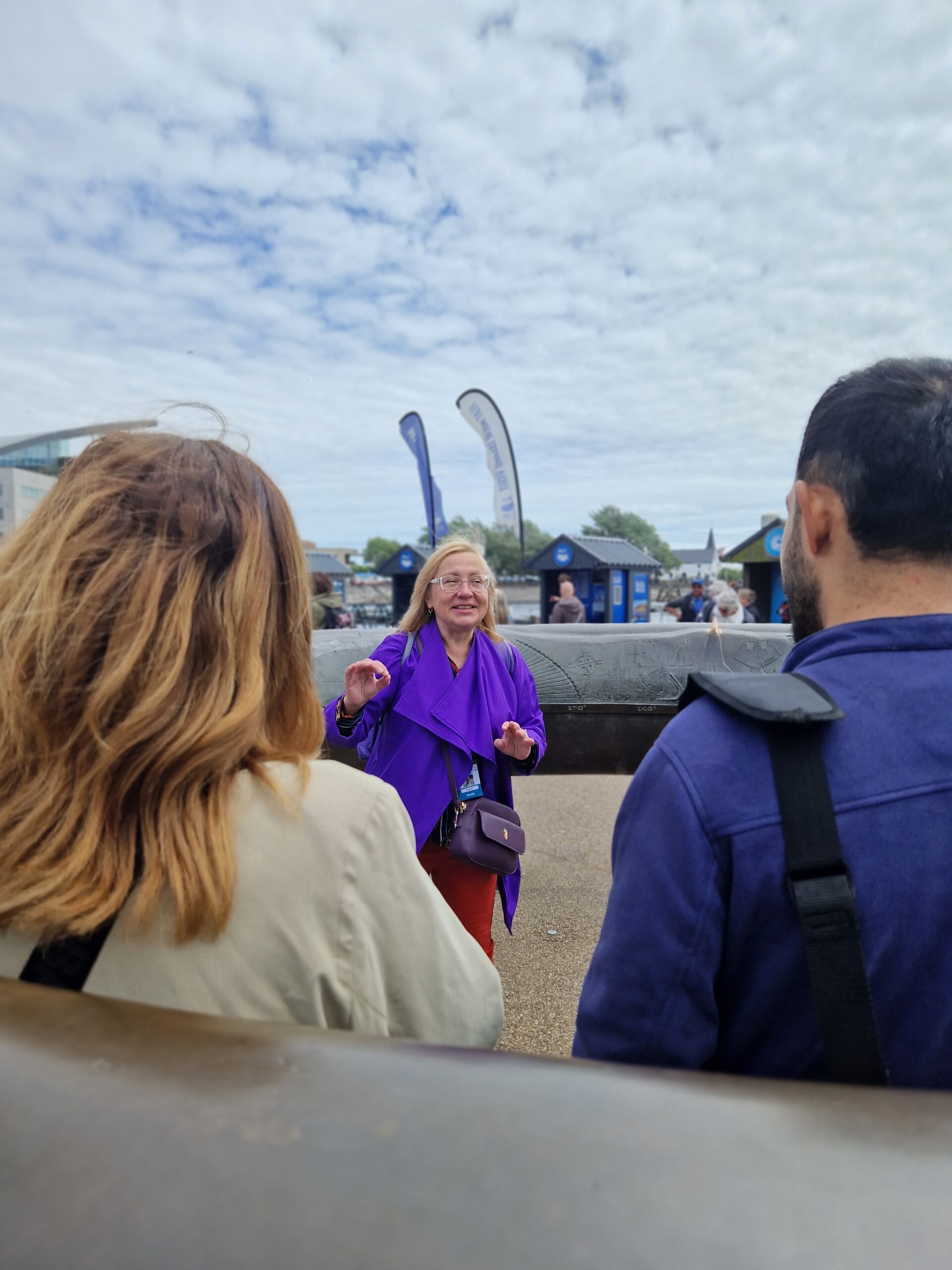
“I’m Larysa and I’m originally from Ukraine. Today, I live in Cardiff and work as a Tour Guide for Invisible Cardiff.
I came to the UK in April 2022 after being forced to leave Ukraine because of the Russian invasion.
For me, community is more than a group of people. Community means the ability to synchronise efforts to achieve common goals, having the opportunity to share knowledge and experience with people that needs it and know how to use it to achieve the common good.”
“My city was occupied. My friends were killed. The lives of my family and myself were under daily threat.
We had no water, no food, and no heat. And no promise that it ever ends.
Being a refugee is different from being an immigrant. It is not your decision, and you don’t have time to prepare.
I simply put two children in the car, along with our two huge dogs and two cats, and we drove off. We packed the car with bags of pet food, leaving no room for personal belongings. We just drove without knowing where we would sleep the next night.
The journey to Wales took over a month. It was difficult, unpredictable and scary.
But at the same time, we felt relief – we knew we had escaped things even worse than death.
In my hometown, hundreds of people were tortured to death. Mass graves of civilians bearing signs of torture are still being discovered.
When arriving in the UK, I was thankful that I no longer had to scan the sky for fighter jets or bombers.
The family who invited me and my children to stay in their home showed incredible kindness, generosity and compassion.
The community at St Ellteyrn’s Church in Creigiau became my first support group, as did Cardiff for Ukraine, a fantastic organisation founded by Welsh activist, Helen McAdie.
And of course, the Invisible Cities community. I was lucky to meet many friends here who helped me get through the refugee journey, which often felt like a real-life survival quest.”
“For me, communities are like islands I encounter throughout my odyssey.
I latch onto to an island, find protection and support and share my own knowledge and skills in return.
But then I leave that island, because life is constant growth and change. As I change, so does my environment.
Communities also undergo continuous transformation. And there comes a time when some of their members, like me, set out on a new journey, creating new island-communities. It’s an ongoing, mutual, fluid process.”
“At a local job fair, I saw the Invisible Cities stand was captivated by the woman representing the program, Julia Thomas.
For me, the defining moment wasn’t the programme’s content, but the mentor’s personality.

Becoming a guide was a transformative step in my journey. I shifted from being a guest to becoming a host – someone who could share stories and welcome others to my new home. It was an essential part of rebuilding my identity.
Still, every tour is a challenge for me and comes with anxiety and self-doubt.
I worry about my limited knowledge of the language. I worry that I don’t fully understand aspects of the local culture. I worry I might be telling people things they actually know better than I do.
Every tour brings a wave of impostor syndrome. But it also brings growth.
On every tour, I’m developing my language skills and integrating myself into Welsh culture.”
“Recently, I helped Films4Teens, my film school for refugee children. Together, we created five short films on the theme ‘Community as a superpower’, commissioned by Counterpoints Art.
This theme really resonated with me.
When I first moved into a house with the children, it was empty – no beds, no fridge, no stove for cooking. We slept on the floor and ate on the floor.
We kept our clothes and personal belongings in cardboard boxes.
We had no money to buy furniture or appliances and no real reason to either.
Our legal status in the UK was extremely uncertain.
Living without a fridge was the hardest part. Every day, I had to buy five kilograms of ice to keep food fresh.
Without curtains, we had no privacy.
Even going to bed felt unsettling, knowing that anyone walking by could see you.
But within just three weeks, thanks to the efforts of the community, we had everything we needed – including fridge and curtains (and someone to hang them).
A group of Welsh volunteers, supporting people in difficult situations, took care of all of it.
To me, this is what community really looks like.”
“When thinking about how I can give back to the Welsh community, I don’t think I’ve started to repay my debts there yet.
The only thing I do is give blood twice a year. It’s my quiet way of showing I care.
But when it comes to the Ukrainian community in Cardiff, I do quite a lot.
Last year, I was even honoured with a government title of Volunteer of the Year and received the Nation of Sanctuary award.”
“If someone is new to the UK and struggling to find their place, my advice is simple – just try and find your community, and you’ll be okay.
There are many myths about refugees including that we consume resources that could otherwise benefit local residents. But that’s not true.
If we look beyond emotions and at data, refugees are actually a key factor in the economic and political prosperity of the countries that host them.
Every wave of refugees is like a startup – which the economy encourages to help the country progress. It requires investment at the beginning, but once it’s up and running, it creates new opportunities and addresses existing needs.
Refugees bring “fresh blood” – new skills, knowledge, cultures and different perspectives. It’s a continuous process of enrichment and renewal.”
“The superpower of a community is the sum of the superpowers of each of its members. It’s a synergy.
There are a few fundamental principles that I try to live by:
Never in human history has the future felt so uncertain.
We’ve reached a point where everything seems unpredictable.
The only way forward is together, united as families, as nations and as a planet.
Something that inspires me: “Community” is a verb.”